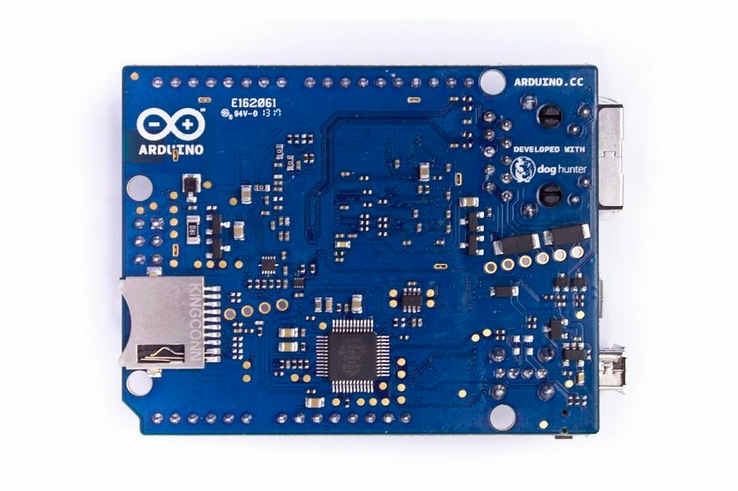Massimo Banzi announced it some minutes ago during his annual “The state of Arduino” presentation at Maker Faire Bay Area: Arduino Yún is the first of a revolutionary family of wifi products combining Arduino with Linux.
Yún means “cloud” in chinese language, as the purpose of this board to make it simple to connect to complex web services directly from Arduino.
Designed in collaboration with Dog Hunter, a company with extensive experience with Linux, the board adopts the Linino distribution which provides signed packages to ensure the authenticity of the software installed on the device.
Historically, interfacing Arduino with complex web services has been quite a challenge due to the limited memory available and they tend to use verbose text based formats like XML that require quite a lot or ram to parse. On the Arduino Yún we have created the Bridge library which delegates all network connections and processing of HTTP transactions to the Linux machine.
Arduino Yún is the combination of a classic Arduino Leonardo (based on the Atmega32U4 processor) with a Wifi system-on-a-chip running Linino (a MIPS GNU/Linux based on OpenWRT). It’s based on the ATMega32u4 microcontroller and on the Atheros AR9331, a system on a chip running Linino, a customized version of OpenWRT, the most used Linux distribution for embedded devices.
Like a Leonardo, it has 14 digital input/output pins (of which 7 can be used as PWM outputs and 12 as analog inputs), a 16 MHz crystal oscillator and a micro USB connector.

Like any modern computer, it’s Wi-Fi enabled, it has a Standard-A type USB connector to which you can connect your USB devices and it has a micro-SD card plug, for additional storage.
The Yún ATMega32u4 can be programmed as a standard Arduino board by plugging it to your computer with the micro USB connector. And you can also program it via Wi-Fi.
When the Yún is turned on for the first time, it becomes an Access Point, creating a Wi-Fi network named “Arduino”. Open your browser and go to the webpanel: configure the board by entering your Wi-Fi network name, type and password. Click the “Configure” button to restart the board and have it join your home network. Opening the IDE, you’ll see it listed in the “Port” sub menu with its IP address instead of the serial port name.
Using the Bridge library in your sketches, you can link the 32u4 to Linux, launching programs and scripts, passing them parameters (sensor readings for example) and reading their output, thus creating a strong integration between the creativity of your sketch and the power of Linux. The Yún supports Shell and Python scripts out-of-the-box but you can install a wide range of open source software and tools.
For the Linux geek in you, Yún can be reached with SSH: that means you’ll be able to customize it in whatever way. And you’ll always be able to reset it to its factory settings.
On top of that to make it even simpler to create complex applications we’ve partnered with the innovative startup Temboo which provides normalized access to 100+ APIs from a single point of contact allowing developers to mix and match data coming from multiple platforms (for example Twitter, Facebook, Foursquare but even FedEx or PayPal).
Arduino Yún will be available at the end of June at the price of 69$ + taxes.
This entry was posted by Zoe Romano on Saturday, May 18th, 2013 and is filed under Announcements, arduino, Hardware, MakerFaire, Wifi, Wireless. You can follow any responses to this entry through the RSS 2.0 feed. You can leave a response, or trackback from your own site.